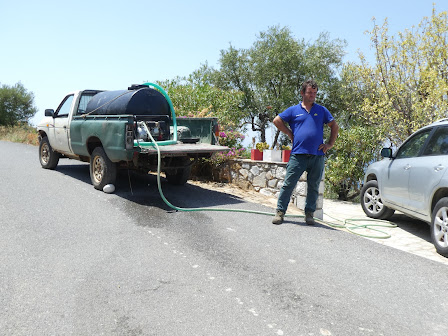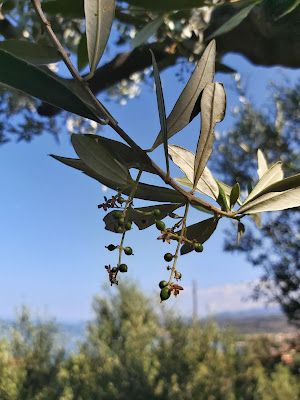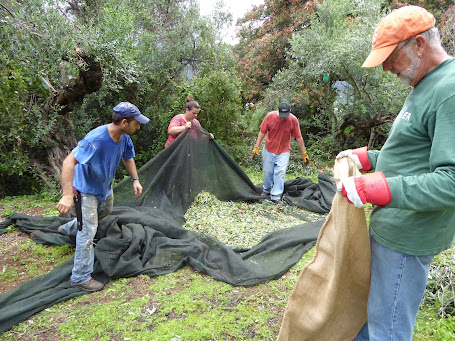The old adage, 'where there there's smoke, there's fire' takes on a different meaning in Greece.
 |
| Olive harvest and burn season in Greece. |
Because in Greece where there is smoke, it is likely from a cigarette.
Our recent house guest was the one who called it to our attention as he viewed our world from the perspective of a first-time visitor to Greece. 'Don't they worry about lung cancer?' he asked, as we approached an eating establishment. Then reminding us of the impacts of secondhand smoke he directed us to areas where we might least be impacted by the neighboring table's smoke.
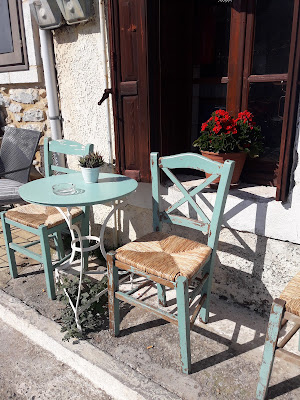 |
| The ubiquitous ashtray |
While smoking inside public facilities is illegal and punishable by fines, it is okay to smoke outside while seated in restaurant and bar patios, waiting areas at bus or train stations, and outside of airports.
What gobsmacked our guest was the numbers of people smoking.
What gobsmacked us was the realization that it didn't bother us anymore - in fact, we hadn't paid it any mind until it was pointed out to us.
Smoking is a tradition, a part of Greek everyday life. They smoke packaged cigarettes, they roll cigarettes, they vape. A survey a couple years ago showed that nearly 37% of the population regularly lights up. In fact, Greeks aren't the only ones. Many of our fellow expats and tourists who hail from countries on this side of the pond also smoke.
 |
| Cigarettes and coffee cups a normal table next to us this morning |
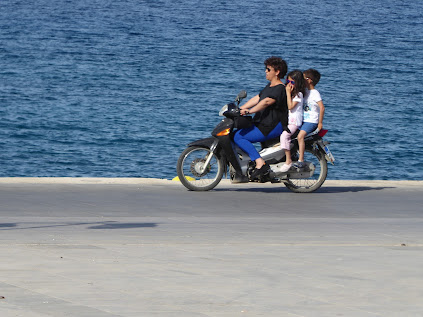 |
| Mom and the kids |
Smoking is simply such a part of the fabric of Greek life that despite the implementation of a spate of laws and fines to curb it within the last decade, there appears to be little desire or peer pressure to kick the habit.
It got me to thinking about other behaviors we have come to accept as normal, but which are bona fide health hazards. Things like not wearing helmets on bikes or motorcycles, transporting multiple people onto a motorcycle or scooter at a time, or riding in the back of a pickup. We see them done all the time.
 |
| Helmet-less in Greece and having a good time |
Don't get me wrong. There are laws and fines concerning smoking and they have - generally -succeeded in preventing smoking inside public venues. Greece has a helmet law, dictating a 350 euro fine for failure to wear them on motorized bikes of any power. (Once we laughed at an elderly man who zipped past bareheaded on his scooter, but he stopped and put on his helmet before pulling into his driveway. He was more fearful of his family's reaction than getting a ticket, we speculated.)
 |
| Tourists travel the main highway to Kalamata with helmets |
You can tell a tourist on a rental bike by the helmets he or she wears. Helmets are recommended for bike riders but not required. Despite our narrow roadways and uneven surfaces, there is a slew of locals who ride bikes but don't wear helmets.
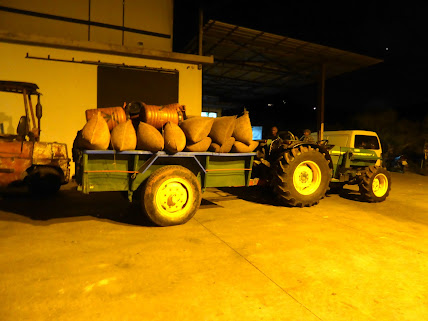 |
| Harvest time vehicles at the olive processor |
Making a right hand turn after stopping for a red light is illegal in Greece. Maybe it is for safety, maybe not. But it is done so routinely in the United States that we have to think twice when the light is red, and we stop then start to make a righthand turn before it turns green.
 |
| Annual equipment tests are mandatory. |
Wearing a seat belt is compulsory inside a car but some of the vehicles driven here are so old I doubt they are even equipped with seatbelts. It is interesting, though, that all car owners are required to have an annual vehicle test; one year it is for emissions and the other year for brakes, lights, shocks and a number of other parts. We suspect few of the old beater cars actually are tested by their owners.
The law requires child restraint seats and the young parents we know adhere to without question by young parents.
A new way of life
In our area of the Peloponnese, we have two police officers and one patrol car. Sometimes we see them on break at a local taverna having a coffee and cigarette, other times patrolling the area. We suspect they don't spend a lot of time monitoring smoking in local establishments nor making stops for minor traffic offenses. If unhealthy behaviors are going to change, it will need to be from personal choices.
Frankly we like this somewhat contrarian approach to life. While we haven't taken up smoking or riding in the back of a pickup, we certainly don't find it objectionable. It is a part of the culture of the community in which we've chosen to make our home. Sometimes we find the lack of laws and government enforcement refreshing. Here you take responsibility for your own actions and can't blame someone for not warning you of hazards.
 |
| Wild boar warning sign in the Mani |
A goal of our expat life was to experience a new culture, even adapt to it. And after nearly a decade of cultural emersion -- without even being consciously aware of it -- I think I can safely say we have adapted to much of the Greek lifestyle.
Yet, if this post has made you think we are living somewhat on the wild side of life here. . .let me assure you that we probably aren't. Because here they do warn us about the wild side of life. . .the wild boar warning sign pictured above is case in point.
How about your travels? Have you encountered any local behaviors or traditions you found objectionable? Or which you thought of as a health hazard, but the locals didn't?
We thank you for your time and send wishes for safe and happy travels to you and yours~ hope you'll join us next time when I ponder the question of being too old to be an expat. . .


